Tag: novel
Peter Sandström: Transparente blanche
30 October 2014 | Mini reviews, Reviews
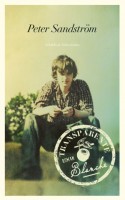 Transparente blanche
Transparente blanche
Helsinki: Schildts & Söderströms, 2014. 226 pp.
ISBN 978-951-523-461-2
€ 28, hardback
Finnish translation:
Valkea kuulas
Suomentanut [Translated by] Outi Menna
Helsinki: Schildts & Söderströms, 2014
ISBN 978-951-523-415-5
Peter Sandström debuted in 1998. His sixth book, the novel Transparente blanche [White transparent: apple variety], is about a middle-aged man who returns to the place of his upbringing and his elderly mother to help her with a strange task she has been given. He is confronted with memories of crucial experiences of his youth – the early death of his father, and his first love – experiences which, the reader understands, guided his life and made him the alienated person he is. The novel also depicts in an unusually sensitive and penetrating way the relationship between a grown man and his mother. However, plot is never the focus of Sandström’s books. His interest lies in using a specific environment and precise and poetic language to depict the vaguest of existential experiences: transience, mortality, changes in the perception of one’s body and in things, the unreliability of memories, the enigma of other people, all that it means to be human, impermanent and thrown into the stream of time.
Translated by David McDuff
Journey to the first palm tree
16 October 2014 | Fiction, Prose
Teemu is a fat, desperate middle-aged man who’s had it with life – he drives his old Lada to Spain, where he intends to commit suicide by letting himself be trampled to death by bulls in the Pamplona bullrun. (However, there is a chance of this tragedy being cancelled, thanks to a tenacious hitch-hiker, female.) An extract from the novel Särkyvää (‘Fragile’, Tammi, 2014)
When I was seventeen, I yearned to leave behind the small town where I grew up. I heard the owl hooting in the forest: go to Europe.
I heard the dirt-track gravel crunching beneath my shoes: run, lad, run.
The birch in the yard rustled and whispered: if you spend one more summer hanging around the garden of your childhood, you’ll stay here forever.
A frog in the ditch gave a stern croak: look at your father; if you don’t escape you’ll end up an old codger just like him.
Even the smoke twirling up from the sauna chimney spoke to me in billows: I’ll show you the right direction, head south, and don’t stop until you see the first camel. More…
Two men in a boat
The meaning of life, Bob Dylan, the broken thermostat of the Earth, the authors Ambrose Bierce and Aleksis Kivi…. Two severely culturally-inclined men set out to row a boat some 700 kilometres along the Finnish coastline, and there is no shortage of things to discuss. Extracts from the novel Nyljetyt ajatukset (‘Fleeced thoughts’, Teos, 2014)
The red sphere of the sun plopped into the sea.
At 23.09 official summertime Köpi announced the reading from his wind-up pocket-watch.
‘There she goes,’ commented Aimo, gazing at the sunken red of the horizon, ‘but don’t you think it’ll pop back up again in another quarter of an hour, unless something absolutely amazing and new happens in the universe and the solar system tonight!’
Aimo pulled long, accelerating sweeps with his oars, slurped the phlegm in his throat, spat a gob overboard, smacked his lips and adjusted his tongue on its marks behind his teeth. There’s a respectable amount of talk about to come out of there, thought Köpi about his old friend’s gestures, and he was right.
‘Sure thing,’ was Aimo’s opening move, ‘darkness. Darkness, that’s the thing. I want to talk about it and on its behalf just now, now in particular, while we’re rowing on the shimmering sea at the lightest point of the summer. More…
Favour and fame: becoming a best-seller
10 April 2014 | In the news
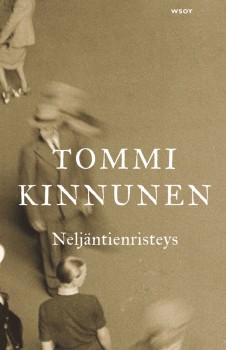 At the top of the list of best-selling books – compiled by the Finnish Booksellers’ Association – in March was the first novel by Tommi Kinnunen, a teacher of Finnish language and literature from Turku. In Neljäntienristeys (‘The crossing of four roads’, WSOY) the narrative spans a century beginning in the late 19th century and is set mainly in Northern Finland, focusing on the lives of four people related to each other. Undoubtedly well-written, it continues the popular tradition of realistic novels set in the 20th-century Finland.
At the top of the list of best-selling books – compiled by the Finnish Booksellers’ Association – in March was the first novel by Tommi Kinnunen, a teacher of Finnish language and literature from Turku. In Neljäntienristeys (‘The crossing of four roads’, WSOY) the narrative spans a century beginning in the late 19th century and is set mainly in Northern Finland, focusing on the lives of four people related to each other. Undoubtedly well-written, it continues the popular tradition of realistic novels set in the 20th-century Finland.
Finland is a small country with one exceptionally large newspaper, Helsingin Sanomat (read by more than 800,000 people daily). The annual literary prize that carries the paper’s name is awarded to a best first work, and candidates are assessed throughout the year.
In February the paper’s literary critic Antti Majander declared in his review of Kinnunen’s book: ’Such weighty and sure-footed prose debuts appear seldom. If I were to say a couple of times in a decade, I would probably be being over-enthusiastic. But let it be. Critics’ measuring sticks are destined for the bonfire.’ More…
Arne Nevanlinna: Heta
14 March 2014 | Mini reviews, Reviews
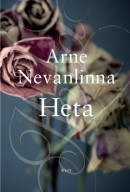 Heta
Heta
Helsinki: WSOY, 2014. 276 pp.
ISBN 978-951-0-40174-3
€34, hardback
The architect and writer Arne Nevanlinna (born 1925) published his first novel, Marie,in 2008; it became one of the six finalists for the Finlandia Prize of Fiction. His fourth novel, Heta, is set in Helsinki in the late 20th century. It depicts the Swedish-speaking Celerius family: Gustava’s seven children – three have died – and their spouses come to celebrate her 70th birthday. Noblesse oblige – the general’s widow is not wealthy, but Gustava has to keep up appearances, so she has four servants. One of them is the bright orphan girl Heta, too often called Clubfoot, because her left leg is shorter than the right, and who, to her surprise, finds out she can read people’s minds. When Gustava dies unexpectedly, poor Heta becomes a murder suspect. The plot takes surprising turns, and the epilogue, in which Heta herself is the narrator, presents the reader with even more revelations; love, it turns out, does conquer all. Nevanlinna’s depictions of the milieu and the era are colourful, and his narrative is laced with plenty of satirical comedy.
Human destinies
7 February 2014 | Articles, Non-fiction
To what extent does a ‘historical novel’ have to lean on facts to become best-sellers? Two new novels from 2013 examined
When Helsingin Sanomat, Finland’s largest newspaper, asked its readers and critics in 2013 to list the ten best novels of the 2000s, the result was a surprisingly unanimous victory for the historical novel.
Both groups listed as their top choices – in the very same order – the following books: Sofi Oksanen: Puhdistus (English translation Purge; WSOY, 2008), Ulla-Lena Lundberg: Is (Finnish translation Jää, ‘Ice’, Schildts & Söderströms, 2012) and Kjell Westö: Där vi en gång gått (Finnish translation Missä kuljimme kerran; ‘Where we once walked‘, Söderströms, 2006).
What kind of historical novel wins over a large readership today, and conversely, why don’t all of the many well-received novels set in the past become bestsellers? More…
Hannu Raittila: Terminaali [Terminal]
23 January 2014 | Mini reviews, Reviews
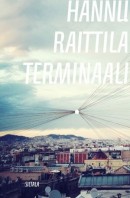 Terminaali
Terminaali
[Terminal]
Helsinki: Siltala, 2013, 454 pp.
ISBN978-952-234-174-7
€32.90, hardback
The airport is a fertile environment for a contemporary novel: a crucible of chance encounters. In his sixth, extensive novel, Hannu Raittila (born 1956) masterfully combines plot and structure: there is adventure, personal relationships, hard living, a love affair, life on a remote Swedish-speaking island. Commodore Lampen sets out to look for his daughter Paula, who has been forcibly brought back to Finland after spending years touring foreign airports. Back in the 1990s Paula and her friend Sara spent a lot of time at Helsinki airport, which developed its own culture of international encounters; this then took them abroad – by accident, on 11 September 2001. Various adventures ensued, including an involvement with the Syrian civil war. Globalisation is based on the free mobility of goods and people, but it also means crumbling of societal structures, and in Raittila’s novel – paradoxically enough – the growing rarity of human encounter.
The books that sold in December
9 January 2014 | In the news
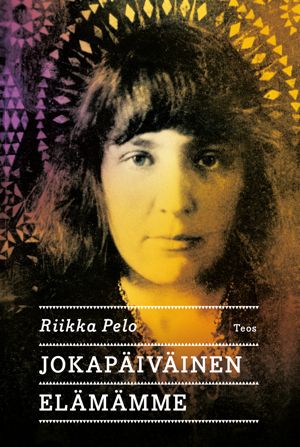 It seems that the Finlandia Prize does, as intended, have a strong influence in book sales. In December, a novel about the Russian poet Marina Tsvetaeva by Riikka Pelo, Jokapäiväinen elämämme (’Our everyday life’), which won the fiction prize in December, reached number one on the list of best-selling Finnish fiction.
It seems that the Finlandia Prize does, as intended, have a strong influence in book sales. In December, a novel about the Russian poet Marina Tsvetaeva by Riikka Pelo, Jokapäiväinen elämämme (’Our everyday life’), which won the fiction prize in December, reached number one on the list of best-selling Finnish fiction.
The next four books on the list – compiled by the Finnish Booksellers’ Association – were the latest thriller by Ilkka Remes, Omertan liitto (‘The Omerta union’), a novel Me, keisarinna (‘We, the tsarina’), about the Russian empress Catherine the Great by Laila Hirvisaari, a novel, Hägring 38 (‘Mirage 38’), by Kjell Westö, and a novel, Kunkku (‘The king’), by Tuomas Kyrö.
The winner of the Finlandia Prize for Non-Fiction, Murtuneet mielet (‘Broken minds’), about the mentally crippled Finnish soldiers in the Second World War, also did well: it was number two on the non-fiction list. (Number one was a book about a Finnish actor and television presenter, Ville Haapasalo, who trained at the theatre academy in St Petersburg and became a film star in Russia.)
The ten best-selling books for children and young people were all Finnish (and written in Finnish): it seems that this time the buyers of Christmas presents favoured books written by Finnish authors.
Tuomas Kyrö: Kunkku [The king]
19 December 2013 | Mini reviews, Reviews
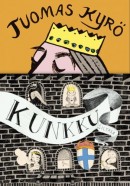 Kunkku
Kunkku
[The king]
Helsinki: Siltala 2013. 549 pp.
ISBN 975-952-234-173-0
€29.90, hardback
This novel is a satirical alternative history of successful Finland and self-destructive Sweden. It is also the story of the king of Finland – the protagonist, Kalle XIV Penttinen, is driven by his instincts, which causes him to fail as a family man. Pena, as he is called, would like to play tennis all day long and watch pole dancing at night. Finland is a fantastic wonderland of film and music industry, tennis, space technology and innovative legal usage, whereas Sweden, ravaged by war, suffers from the trauma that passes from one generation to the next. Estonia has done well for a long time, and the Soviet Union (sic) is a stronghold of democracy. Chuckling, Kyrö turns history upside down. As a writer of short prose and tragicomic novels he is currently a very popular author. However, this time his typically witty associations and inventive comedy suffer from the sheer size of this novel.
Leena Parkkinen: Galtbystä länteen [West from Galtby]
19 December 2013 | Mini reviews, Reviews
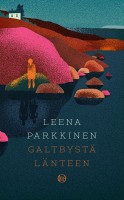 Galtbystä länteen
Galtbystä länteen
[West from Galtby]
Helsinki: Teos, 2013. 339 p.
ISBN 978-951-851-510-7
€32.90, hardback
Leena Parkkinen’s first novel, Sinun jälkeesi, Max (‘After you, Max’) was awarded the Helsingin Sanomat literature prize for best first work of 2009. Her new novel contains crime story ingredients, but the focus is on love between siblings, loss and the demand for truth. The story begins in 1947, after the war, on an island in the south-western Finnish archipelago. Sebastian, brother of Karen, has returned from the front; it’s time to mend the best clothes and dancing shoes. But to the horror of the island community, the body of a young girl is found on the shore, and Sebastian gets the blame. Sixty-five years later her brother’s fate has not left Karen alone, and she sets out to find the truth. Capable of handling different times, Parkkinen (born 1979) is also a skilful interpreter of conflicting sentiments, as unexpected twists develop towards the end.
Not so weird?
12 December 2013 | Non-fiction, Reviews
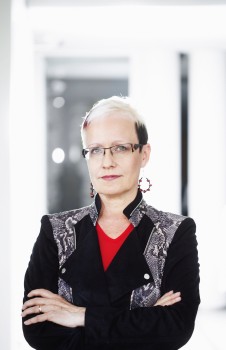
Johanna Sinisalo. Photo: Katja Lösönen
Johanna Sinisalo’s new novel Auringon ydin (‘The core of the sun‘, Teos, 2013), invites readers to take part in a thought experiment: What if a few minor details in the course of history had set things on a different track?
If Finnish society were built on the same principle of sisu, or inner grit, as it is now but with an emphasis on slightly different aspects, Finland in 2017 might be a ‘eusistocracy’. This term comes from the ancient Greek and Latin roots eu (meaning ‘good’) and sistere (‘stop, stand’), and it means an extreme welfare state.
In the alternative Finland portrayed in Auringon ydin, individual freedoms have been drastically restricted in the name of the public good. Restrictions have been placed on dangerous foreign influences: no internet, no mobile phones. All mood-enhancing substances such as alcohol and nicotine have been eradicated. Only one such substance remains in the authorities’ sights: chilli, which continues to make it over the border on occasion. More…
Bring on the white light
12 December 2013 | Fiction, Prose
Extracts from the novel Auringon ydin (‘The core of the sun’, Teos, 2013). Introduction by Outi Järvinen
Jare, March 2017
‘We call the chilli the Inner Fire that we try to tame, just as our forefathers tamed the Worldly Fire before it.’
Mirko pauses dramatically, and Valtteri interrupts. ‘Eusistocratic Finland offers us unique opportunities for experimentation and development. Once all those intoxicants affecting our neurochemistry and the nervous system have been eradicated from society, we will be able to conduct our experiments from a perfectly clean slate.’
‘We fully understand the need to ban alcohol and tobacco. These substances have had significant negative societal impact. And though in hedonistic societies it is claimed that drinks such as red wine can, in small amounts, promote better health, there is always the risk of slipping towards excessive use. All substances that cause states of restlessness and a loss of control over the body have been understandably outlawed, because they can cause harm not only to abusers themselves but also to innocent bystanders,’ Mirko continues.
This is nothing new to me, but I must admit that the criminalisation of chillies has always been a mystery to me. By all accounts it is extremely healthy and contains all necessary vitamins and antioxidants. A dealer that I met once told me that people in foreign countries think eating chillies can lower blood pressure and cholesterol levels – and even prevent cancer. If someone makes a pot of tom yam soup, sweats and pants over it and enjoys the rush it gives him, how is that a threat, either to society or to our health? More…
Pauliina Rauhala: Taivaslaulu [Heaven song]
12 December 2013 | Mini reviews, Reviews
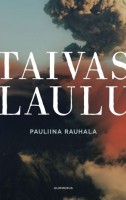 Taivaslaulu
Taivaslaulu
[Heaven song]
Helsinki: Gummerus, 2013. 281 pp.
ISBN 978-951-20-9128-7
€29.90, harcback
A religious revivalist movement is the framework for this skilfully written first novel. A young couple, Vilja and Aleksi, dream of a brood of children. Nine years and four children later Vilja feels that all joy and strength has drained away from her life. Living the reality of their religion’s ban on family planning, the couple is hit hard by the fact that Vilja is expecting twins. This is too much for her; she feels crushed by anxiety and fatigue. The ethical ground of parenthood, the good and bad sides of a religious community as well as the myths and expectations surrounding motherhood are Rauhala’s main themes. This impressive tale also contains a love story; Aleksi is a credible and sympathetic husband who first and foremost wants to believe in his wife and his family.
The Finlandia Prize for Fiction 2013
5 December 2013 | In the news
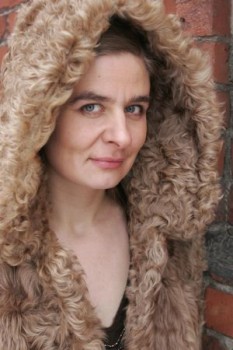
Riikka Pelo. Photo: Heini Lehväslaiho
The director general of the Helsinki City Theatre, Asko Sarkola, announced the winner of the 30th Finlandia Literature Prize for Fiction, chosen from a shortlist of six novels, on 2 December in Helsinki. The prize, worth €30,000, was awarded to Riikka Pelo for her novel Jokapäiväinen elämämme (‘Our everyday life’, Teos).
In his award speech Sarkola – and actor by training – characterised the six novels as ‘six different roles’:
‘They are united by a bold and deep understanding of individuality and humanity against the surrounding period. They are the perspectives of fictive individuals, new interpretations of the reality we imagine or suppose. Viewfinders on the present, warnings of the future.
‘Riikka Pelo‘s Jokapäiväinen elämämme is wound around two periods and places, Czechoslovakia in 1923 and the Soviet Union in 1939–41. The central characters are the poet Marina Tsvetaeva and her daughter Alya. This novel has the widest scope: from stream of consciousness to interrogations in torture chambers and the labour camps of Vorkuta; always moving, heart-stopping, irrespective of the settings.’
The five other novels were Ystäväni Rasputin (’My friend Rasputin’) by JP Koskinen, Hotel Sapiens (Teos) by Leena Krohn, Terminaali (‘The terminal’, Siltala) by Hannu Raittila, Herodes (‘Herod’, WSOY) by Asko Sahlberg and Hägring 38 (‘Mirage 38’, Schildts & Söderströms; Finnish translation, Kangastus, Otava) by Kjell Westö (see In the news for brief features).
JP Koskinen: Ystäväni Rasputin [My friend Rasputin]
5 December 2013 | Mini reviews, Reviews
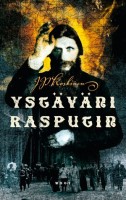 Ystäväni Rasputin
Ystäväni Rasputin
[My friend Rasputin]
Helsinki: WSOY, 2013. 355 pp.
ISBN 978-951-0-39772-5
€29.50, hardback
Prophet, healer, mystic – and political player and lecher. The hectic life of the Russian Rasputin, which ended in 1916 in assassination, offers excellent material for JP Koskinen’s novel. The fictive narrator is the young Vasili, who Rasputin hopes will be a follower. The mix of fear and adulation and wild events, described from the point of view of the young boy, are persuasive. At the court of Tsar Nicholas II Rasputin gained favour because the Tsarina trusted almost blindly in his healing abilities: the imperial family’s son Alexei was a haemophiliac. JP Koskinen’s earlier works include science fiction. Ystäväni Rasputin is a skilful writer’s description of historial events on the eve of the Russian revolution; it paints an interesting and intense portait of the atmosphere and events of the St Petersburg court. Koskinen does not over-explain; interpretation is left to the reader. The novel was on the Finlandia Prize shortlist.
Translated by Hildi Hawkins
